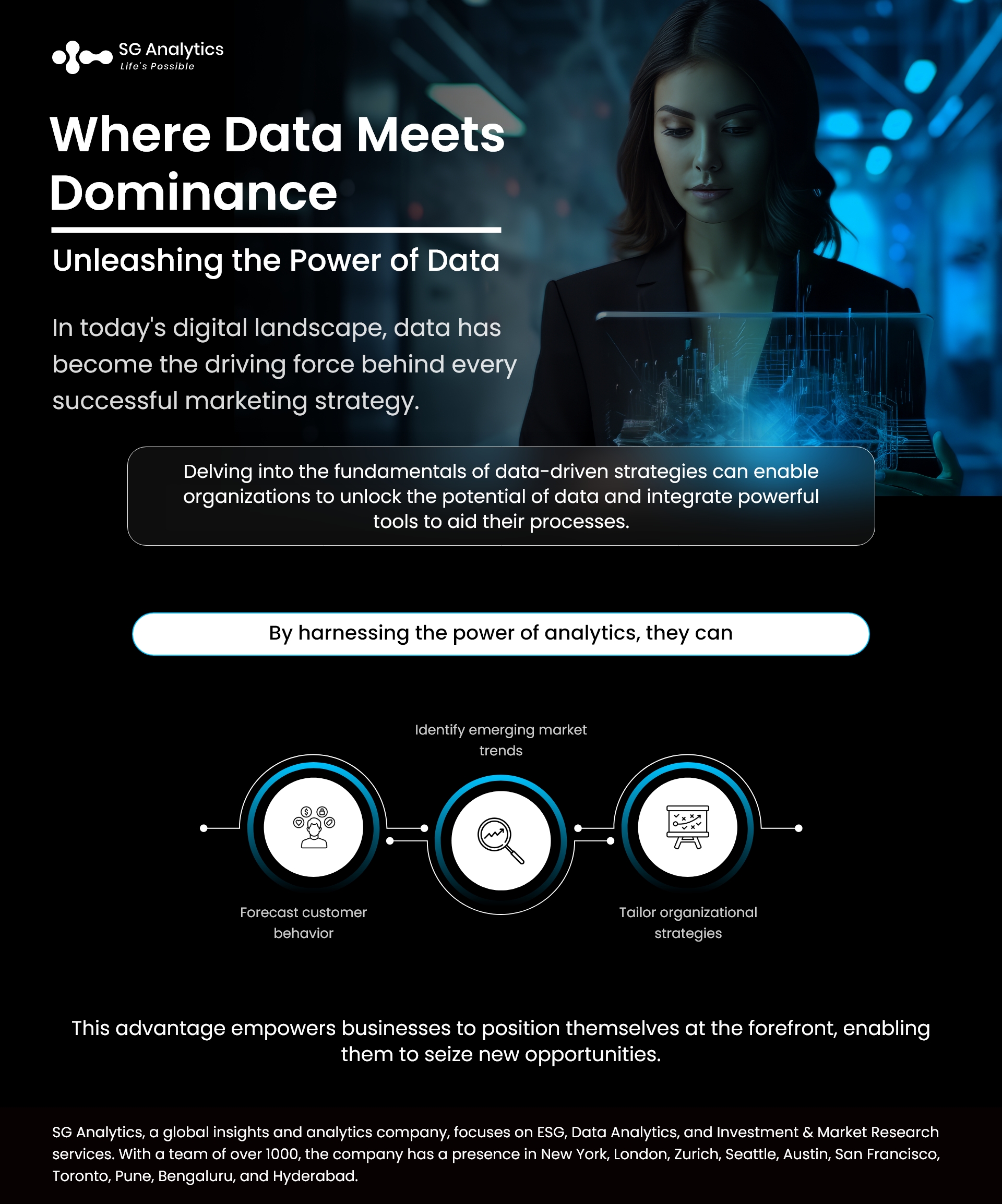In today's digital landscape, data has become the driving force behind every successful marketing strategy. With the vast amount of data available, it is critical for businesses to harness the power of data and gain critical insights for informed decision making. By delving into the fundamentals of data-driven strategies, organizations can unlock the potential of data and integrate powerful tools to aid their processes.
From a business perspective, data analytics has become an important tool. By harnessing the power of data, organizations need to identify patterns, trends, and correlations and understand consumer behavior, preferences, and needs.
Data analytics help enhance operational efficiency. By analyzing historical data on production processes along with customers' purchasing patterns and personalizing product recommendations, organizations can enhance their sales and customer satisfaction. They can identify bottlenecks and inefficiencies, enabling them to streamline operations and reduce costs.
By analyzing customer data, organizations can identify customer segments with specific preferences. This enables them to tailor marketing campaigns, promotions, and product offerings, thus resulting in better customer engagement and increased sales. However, buried within this vast sea of data lies the potential to unlock valuable insights to drive growth and success. This is where the power of data analytics comes into play.
Read more: Data Revolution: Empowering Businesses for a Data-driven Future
Not only does data analytics benefit businesses, but it also significantly impacts different industries, including healthcare, finance, and transportation.
- In healthcare, data analytics can be leveraged to enhance patient outcomes, identify patterns, and develop personalized treatment plans.
- In finance, data analytics can assist with detecting fraudulent transactions, assessing creditworthiness, and optimizing investment strategies.
- In transportation, data analytics can help with smarter route planning, reduce fuel consumption, and enhance safety.

To unleash the power of data analytics, organizations need to adopt a systematic approach. Some of the key steps involved in the data analytics process include:
- Data Collection: The first step involves gathering relevant data from different sources like databases, data warehouses, and external sources. This involves extracting, transforming, and loading data in a centralized repository.
- Data Cleaning: Raw data contains errors, duplicates, and inconsistencies. Data cleaning helps remove these errors and ensures data accuracy and reliability.
- Data Exploration: Once the data is cleaned, data analysts can explore and visualize it to better understand its characteristics and identify potential patterns.
- Data Modeling: In this step, statistical and machine learning techniques are used to build models to predict future outcomes or uncover hidden insights. This involves regression analysis, classification, or other advanced algorithms.
- Data Interpretation: The final step involves interpreting data results and presenting actionable insights. It is important for analysts to communicate their findings effectively to stakeholders, enabling them to make data-driven decisions.
Read more: From Mess to Magic: Streamlining Data Operations for Maximum Efficiency
Unleashing the Potential of Data Analysis
In today's era where technological advancements reign supreme, the integration of Artificial Intelligence (AI) has exceeded mere fascination and is becoming an indispensable tool for businesses worldwide. From discussions on democratizing data to optimal structuring, data insights cater to those who champion the belief that data is truly everyone's business. AI is emerging as a formidable force in marketing, wielding its transformative power to revolutionize the way businesses engage with their audience.
Harnessing the power of data entails responsibility. The landscape of data and privacy rules continues to evolve and must be taken seriously. Navigating regulations is also a critical aspect of responsible data management.
By harnessing the power of data and analytics, marketers can forecast customer behavior, identify emerging market trends, and tailor their organizational strategies accordingly. This precognitive advantage empowers businesses to position themselves at the forefront, enabling them to seize new opportunities.
The ability to discover meaningful insights from vast data sets enables businesses to identify hidden patterns, preferences, and trends within their target market. By fathoming these cryptic messages, organizations can wield newfound knowledge and forge hyper-targeted marketing campaigns, ensuring maximum impact and conversion rates.
Read more: DataVersity: Embracing the Power of Unified Data Solutions

Harnessing the Power of Data Analytics
Data analytics is the process of examining raw data to discover patterns, trends, and correlations that can inform business insights. By harnessing the power of data, organizations can achieve a competitive edge by making data-driven decisions based on evidence.
- Defining clear business objectives: Before diving into the world of data analysis, it is important to define what to achieve. Whether increasing revenue, enhancing customer satisfaction, or optimizing operations, setting clear objectives will help guide organizations and ensure focus on the most relevant data.
- Collecting and organizing data effectively: Data is valuable if it is accurate, complete, and well-organized. Implementing robust data collection processes and investing in data management systems can further help ensure reliable and accessible data.
- Utilizing analytics tools: There are a plethora of data analytics tools available - from simple spreadsheet software to advanced machine learning algorithms. These tools help align with business needs and technical capabilities.
- Iterating and improving: Data analytics is an ongoing process. Reviewing and analyzing data regularly helps identify new insights and adapt strategies accordingly. To stay ahead of today's competition, organizations need to embrace a culture of continuous improvement.
Overcoming data challenges not only safeguards information but also positions them as an organization that treats data privacy seriously and helps foster trust with the audience.
In conclusion, data analytics holds immense potential to unlock growth for businesses. With the power of data, organizations can gain critical insights for making informed decisions and staying ahead of their competition. Whether it is through analyzing customer data, optimizing operations, or personalizing user experiences, data analytics is a critical tool in today's data-driven world.
Read more: Harnessing the Power of Data to Transform Business Models and Drive Growth

Final Thoughts
In today's ever-evolving landscape of regulatory practices, the role of technology and data-driven decision-making is gaining significance.
Organizations are embarking on a mission to understand how they can embrace different forms of regulatory technology. From foundational systems managing licensing and permitting workflows to using cutting-edge tools, organizations are scratching the surface of digital solutions to enhance their effectiveness.
Becoming a data-driven and intelligence-led regulator is an ongoing journey and requires leadership, cultural change, and incremental advancements in data capabilities. While many challenges persist, the benefits of data-driven decision-making involve embracing targeted regulatory efforts, along with improved complaint triaging and enhanced enforcement efforts.
A leading enterprise in Data Solutions, SG Analytics focuses on integrating a data-driven decision framework and offers in-depth domain knowledge of the underlying data with expertise in technology, data analytics, and automation. Contact us today to make critical data-driven decisions, prompting accelerated business expansion and breakthrough performance.
About SG Analytics
SG Analytics (SGA) is an industry-leading global data solutions firm providing data-centric research and contextual analytics services to its clients, including Fortune 500 companies, across BFSI, Technology, Media & Entertainment, and Healthcare sectors. Established in 2007, SG Analytics is a Great Place to Work® (GPTW) certified company with a team of over 1200 employees and a presence across the U.S.A., the UK, Switzerland, Poland, and India.
Apart from being recognized by reputed firms such as Gartner, Everest Group, and ISG, SGA has been featured in the elite Deloitte Technology Fast 50 India 2023 and APAC 2024 High Growth Companies by the Financial Times & Statista.









